
At Ipsen Biopharm, we’re committed to developing groundbreaking therapies in neuroscience, oncology, and rare diseases. With more than 500 skilled professionals on site in Wrexham, we know exactly how critical science, technology, engineering, and maths (STEM) skills are to our success.
As a Centre of Excellence for both neuroscience and biopharmaceutical drug development, our team is driven by challenges and breakthroughs. My role in Bioprocess Sciences is to oversee the development of the manufacturing processes that make these therapies possible.
The skills required here are as diverse as the fields we touch – maths and science don’t just support research and development (R&D); they’re essential across all our functions. This is why our STEM outreach team works to make sure young people understand how a strong foundation in these fields can open countless career paths. Whether in manufacturing, finance, or human resources, problem-solving and innovation are woven into the fabric of our daily operations.
The question I hear often from young people – even from my own children – is: “What’s the point of all these equations and formulas?”
It’s a fair question in today’s tech-heavy world, where even simple maths is often done by apps and software. But the value of STEM lies not only in the hard skills themselves but in the critical thinking, problem-solving, and adaptability these subjects foster.
In industry, curiosity and the ability to make connections are the keys to innovation and problem-solving. These are the skills that allow us to move from identifying issues and/or gaps and then developing process improvements to resolve them.
And from primary to secondary education, we aim to foster that same curiosity and problem-solving mindset within the next generation, with a particular focus on our local area of Wrexham.
We aim to bring STEM to life by showing pupils how STEM skills translate into meaningful careers. Through classroom activities, career fairs, and interactive workshops, we demonstrate how maths and science can support fulfilling careers that contribute to society, even in areas beyond the lab. Students get a closer look at the many career options STEM offers, from the development of new therapies to finance roles essential to our operations.
By focusing on STEM’s role in problem-solving and societal contribution, we hope to inspire a new generation to apply these skills not just in the lab or classroom but in the broader world. It’s not just about solving equations; it’s about building resilience, sparking curiosity, and driving progress. We believe that these skills – whether they lead to a career in pharmaceuticals or beyond – are the foundation for a more innovative, compassionate future.























